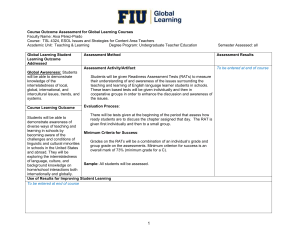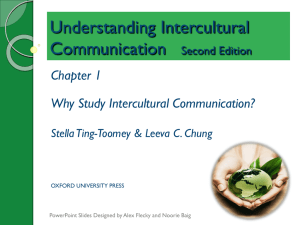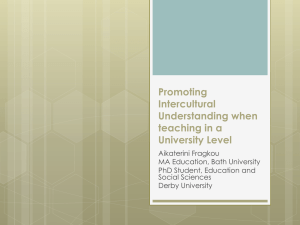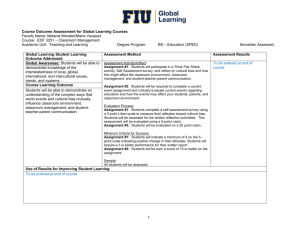Matrix - FIU Global Learning
advertisement
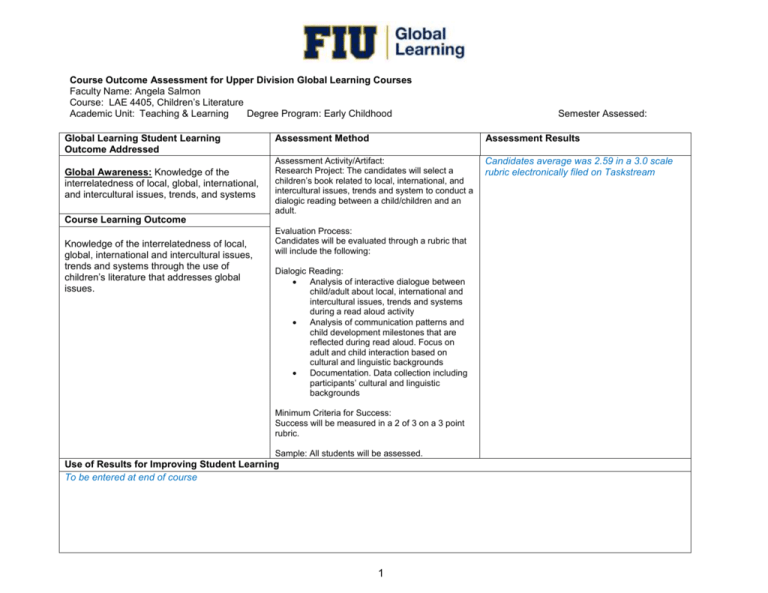
Course Outcome Assessment for Upper Division Global Learning Courses Faculty Name: Angela Salmon Course: LAE 4405, Children’s Literature Academic Unit: Teaching & Learning Degree Program: Early Childhood Global Learning Student Learning Outcome Addressed Global Awareness: Knowledge of the interrelatedness of local, global, international, and intercultural issues, trends, and systems Assessment Method Assessment Results Assessment Activity/Artifact: Research Project: The candidates will select a children’s book related to local, international, and intercultural issues, trends and system to conduct a dialogic reading between a child/children and an adult. Candidates average was 2.59 in a 3.0 scale rubric electronically filed on Taskstream Course Learning Outcome Knowledge of the interrelatedness of local, global, international and intercultural issues, trends and systems through the use of children’s literature that addresses global issues. Semester Assessed: Evaluation Process: Candidates will be evaluated through a rubric that will include the following: Dialogic Reading: Analysis of interactive dialogue between child/adult about local, international and intercultural issues, trends and systems during a read aloud activity Analysis of communication patterns and child development milestones that are reflected during read aloud. Focus on adult and child interaction based on cultural and linguistic backgrounds Documentation. Data collection including participants’ cultural and linguistic backgrounds Minimum Criteria for Success: Success will be measured in a 2 of 3 on a 3 point rubric. Sample: All students will be assessed. Use of Results for Improving Student Learning To be entered at end of course 1 Course Outcome Assessment for Upper Division Global Learning Courses Faculty Name: Angela Salmon Course: LAE 4405, Children’s Literature Academic Unit: Teaching & Learning Degree Program: Early Childhood Global Learning Student Learning Outcome Addressed Global Perspective: Ability to develop a multi-perspective analysis of local, global, international, and intercultural problems Course Learning Outcome Ability to analyze the various literary devices and genres that authors use to present multiple perspectives of local, global, international and intercultural problems. Semester Assessed: Assessment Method Assessment Results Assessment Activity/Artifact: Author’s Project: The candidates will conduct research of two authors from different cultural backgrounds and compare and contrast how they reflect multiple cultural perspectives through the use of different literary devices and genres. For example, Tommie de Paola was an Italian descendent. Most of his books were influenced by his Italian heritage and growing in America while Patricia Polacco was a Russian descendent who write stories about Russian traditions practiced in America. Both authors write stories about their personal experiences of immigrant families that come to the United States due to political and economic problems in their countries. This assignment was replaced with a special topic reflection which contained global learning outcomes which overlap Reading Competencies that cover diversity. Evaluation Process: Candidates will be evaluated through a rubric that will include the following: Genre, style & sound: Bring at least five books and Identify the authors’ genre preference, style and sound; demonstrate how authors get their message through about local, global, and intercultural problems Authors’/illustrators’ background: Identify how historical, cultural and personal elements contributed to the creation of children’s books Compare and contrast how authors from different cultural backgrounds express similar concerns about global issues Minimum Criteria for Success: Success will be measured in a 2 of 3 on a 3 point rubric Sample: All students will be assessed. Use of Results for Improving Student Learning 2 The results of this assessment was 2.82 in a 3.00 rubric electronically filed on Taskstream. Course Outcome Assessment for Upper Division Global Learning Courses Faculty Name: Angela Salmon Course: LAE 4405, Children’s Literature Academic Unit: Teaching & Learning Degree Program: Early Childhood Global Learning Student Learning Assessment Method Outcome Addressed To be entered at end of course 3 Semester Assessed: Assessment Results Course Outcome Assessment for Upper Division Global Learning Courses Faculty Name: Angela Salmon Course: LAE 4405, Children’s Literature Academic Unit: Teaching & Learning Degree Program: Early Childhood Global Learning Student Learning Assessment Method Outcome Addressed Global Engagement: Willingness to engage in local, global, international, and intercultural problem solving Course Learning Outcome Willingness to design a classroom activity wherein the students solve a local or global problem. Assessment Activity/Artifact: Jump Start Kit: Design of environmentally sustainable activities in their classroom. The candidates will design a Jump Start kit that includes a set of at least 10 developmentally appropriate children’s books that address local, global, international, and intercultural problems. Students should develop activities or book extensions towards finding solutions to global, international and intercultural problems. For example, a Jump Start Kit related to global warming. The candidates will select children’s books about pollution, deforestation, weather changes, natural disasters, animals at risk of extinction and so forth and so on. Organize a rethink-reuse-recycle campaign. Evaluation Process: Candidates will be evaluated through a rubric that will include the following: Selection of developmentally appropriate children’s books that address local, global, international and intercultural problems Description and explanation on how this collection of children’s books promote children’s social, emotional, cognitive, aesthetic and language development Book extensions that reveal children’s understanding of global, international and intercultural problems and its solutions Minimum Criteria for Success: Success will be measured in a 2 of 3 on a 3 point rubric Sample: All students will be assessed. Use of Results for Improving Student Learning 4 Semester Assessed: Assessment Results Candidates average was 3.0 in a 3.0 scale rubric electronically filed on Taskstream Course Outcome Assessment for Upper Division Global Learning Courses Faculty Name: Angela Salmon Course: LAE 4405, Children’s Literature Academic Unit: Teaching & Learning Degree Program: Early Childhood Global Learning Student Learning Assessment Method Outcome Addressed To be entered at end of course 5 Semester Assessed: Assessment Results




